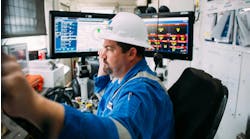UTM authorizes FEED for Nigeria’s first FLNG project
Offshore staff
LONDON — UTM Floating Liquefied Natural Gas (LNG) has signed a FEED contract with JGC Corp., Technip Energies and KBR for the development of Nigeria’s first FLNG facility.
The planned FLNG will have a capacity to process 176 MMscf/d of natural gas and condensate and will be located at the Yoho Field in offshore Block OML 204, operated by Exxon Mobil, in partnership with NNPC.
The vessel, which could be completed by 2026, will feature a turret mooring system, gas pre-treatment modules, LNG production modules, living quarters, self-contained power generation and utilities, along with storage and offloading.
Nigeria’s government is looking to monetize more than 209 Tcf of proven gas resources with a potential upside of 600 Tcf.
Chief Timipre Sylva, Minister of Petroleum Resources, said during the signing ceremony, “We are aware that the number of offshore gas finds has surged in recent years around the world, with LNG and FLNG becoming even more important in terms of satisfying the world's future energy needs.
“According to market research analysts, the FLNG market is estimated to increase at a compound annual growth rate of 27.14%, reaching $88.99 billion by 2024. The UTM offshore FLNG project is therefore timely…”
Julius Dediare Rone, CEO and chairman of UTM Offshore, added, “We opted for FLNG because FLNG was originally developed to help realize the promise of natural gas—specifically, to bring gas to the global market from small offshore fields and near-shore terminals in areas lacking infrastructure—especially pipelines.
“And the LNG market is stuck with traditional models that do not address the world’s demand for low-cost, flexible LNG to become a preferred fuel-of-choice over coal and liquids….
“The solution, UTM offshore believes, is a standardized FLNG that allows the costs to be 20-40% cheaper with FID thresholds of just 1.5 - 2.5 MTPA.”
Earlier this year in Abuja, the company, in partnership with African Export-Import Bank (Afreximbank), signed a memorandum of understanding to raise an initial sum of $2 billion for the first phase of the development, with a commitment for $3 billion in the second phase
11.17.2022



